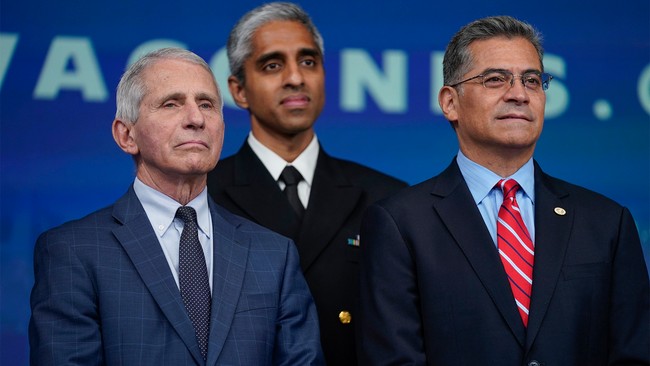
The White House is asking Senate Majority Leader John Thune (R-S.D.) to expedite the process of confirming several presidential appointees, including Casey Means, the president’s choice for surgeon general.
Means is not your typical nominee for surgeon general. She doesn’t have an active medical license, which is neither here nor there. There’s no Constitutional requirement that the surgeon general need be a doctor. In fact, there’s no Constitutional requirement for a surgeon general. The office was created in 1871 and was initially focused on the health of merchant seamen.
“The Office of the Surgeon General is a vital part of the US government’s efforts to improve the health and well-being of its citizens by providing scientific leadership, public health communication, and a dedicated uniformed service,” according to the Health and Human Services (HHS) website, for which the surgeon general works.
You’re right when reading that description to think of the COVID-19 pandemic and how miserably the entire public health sector performed during that critical period. The “science” and “communication” were not only lacking but were also oftentimes proven wrong or misleading.
Is Means the right candidate to restore faith in “public health”? A better question would be whether the office of the Surgeon General is necessary for the good health of American citizens.
J.D. Tuccille of Reason.com doesn’t think so.
Panic often drives people to seek salvation from officials eager to exploit opportunities to expand their power. With little scientific basis and no consideration for tradeoffs, governments imposed lockdowns and mask mandates, limited travel, intervened in economies, and otherwise limited our freedom in the name of public health. As I noted in 2021—after Professor Neil Ferguson, a prominent advisor on pandemic policy to Britain’s government, opened up about the sources of his colleagues’ policy ideas—”the public health professionals behind the lockdowns took their inspiration from totalitarian China.”
These interventions made the world poorer, nuttier, and more crime-ridden. Years later, we’re recovering. But some of those ill effects will be with us for a long time to come. George Will wrote two weeks ago that “the coronavirus pandemic is over. What it revealed lingers: intellectual malpractice and authoritarian impulses infecting governmental, scientific, academic and media institutions.”
Joe Biden included Surgeon General Vivek Murthy on his COVID advisory board, but we know who was driving that bus: Anthony Fauci, the most influential public health official in U.S. history.
Murthy was little more than a mouthpiece for Fauci, echoing his wrongheaded advice on staying safe during the pandemic and repeating his ruinous directives to keep schools and offices closed.
Beyond that, Murthy stuck his nose into every political issue he could, even if it was unrelated to public health. His most famous pronouncement was urging the banning of assault weapons. Why a surgeon general felt it necessary to stick his nose into the gun control debate was never explained.
Akiva Malamet, Bautista Vivanco, Michael F. Cannon, and Jeffrey M. Singer co-authored Unnecessary Relics, which was “a report for the libertarian Cato Institute, questioning the justifications for the continued existence of the U.S. surgeon general and the 6,000-member Public Health Service Commissioned Corps led by that office,” writes Tuccille.
As the report points out, “the role of US surgeon general (SG) has morphed from an apolitical supervisor of medical personnel to a divisive activist who undermines public health efforts.” Originally intended to oversee hospitals established for the sailors of the merchant marine and the doctors that staffed them, over time the office and its expanding bureaucracy took on a more amorphous responsibility for “preventing the spread of contagious diseases throughout the United States,” according to the Centers for Disease Control. At one time, the surgeon general headed the entire public health service, but now leads only the uniformed Public Health Service Commissioned Corps.
“Congress should abolish the Office of the Surgeon General, eliminate the office’s non–public health activities, and reassign its public health responsibilities to the CDC or other appropriate federal agencies,” the Cato report concludes. “Eliminating the office’s divisive political advocacy would be a step toward restoring trust and confidence in federal public health officials.” The authors also recommend that “Congress should likewise abolish the PHS [Public Health Service] Commissioned Corps.”
Other departments of the federal government could handle the few duties that the Surgeon General should be engaged in. Removing one more office that causes trouble for citizens is the best idea I’ve heard this week.
Editor’s Note: Radical leftist judges are doing everything they can to hamstring President Trump’s agenda to make America great again.
Help us hold these corrupt judges accountable for their unconstitutional rulings. Join PJ Media VIP and use promo code FIGHT to get 60% off your membership.















